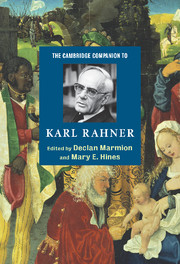18 - Has Rahnerian theology a future?
from Part IV - Retrospect and Prospect
Published online by Cambridge University Press: 28 May 2006
Summary
The reputation of great figures is often eclipsed in the generation after their death, and there is no lack of commentators who regard Rahner's achievement as passé. At the end of this collection of essays on Karl Rahner, compiled in the year when he would have been 100 years old, an obvious question arises about the kind of significance Rahner's theology has for us now. Is Rahner's achievement now primarily a matter of cultural and intellectual history? Does it amount simply to a set of ideas highly influential on Roman Catholicism in the historically rather unusual situation of the 1960s? Are Rahner's lessons something we need to outgrow, whether in gratitude for what they have helped us to accomplish, or in repentance for the errors into which they once seduced us? Or do they still hold a message for the future? Is there still life in Rahnerian theology?
There is no doubt that Rahner’s work enabled official Catholicism rather belatedly to engage with modernity – a modernity of which it had been decidedly wary for four centuries, whether in its initial appearance as a Lutheran appeal to the individual conscience, or later in various forms of Enlightenment emancipation. For many thinkers both in Rahner’s own time and on the contemporary scene, there was something ignoble and mistaken about that engagement. Moreover, it appears ironical that Catholicism should have been trying to catch up with modernity just as the secular world was moving into something different, something so elusive that we can only call it “post-modernity.” It might easily appear that Rahner’s theology is at best an anachronism, and at worst a heretical muddle.
- Type
- Chapter
- Information
- The Cambridge Companion to Karl Rahner , pp. 281 - 296Publisher: Cambridge University PressPrint publication year: 2005



